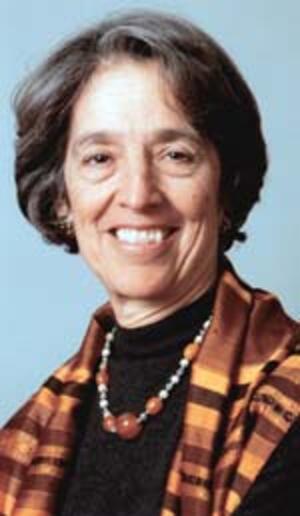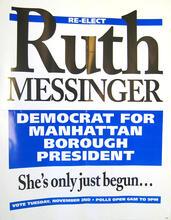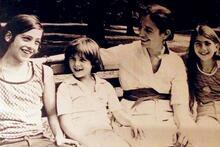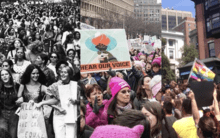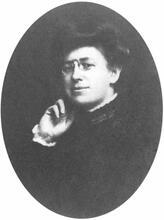Ruth Messinger
Following successive careers as a New York City politician president and director of a major Jewish organization, Ruth Messinger has become nothing less than an icon of American Jewish progressive leadership. Messinger first entered politics as a candidate for the New York State Assembly in 1996. She lost that race but the following year won a City Council seat representing Manhattan’s West Side. In 1990, she became Manhattan borough president. After losing the 1997 mayor’s election to Rudolph Giuliani, she became the president and CEO of the American Jewish World Service, a position she held from 1998 to 2017. She has mentored many rising leaders, especially young women, in the social justice sector of the American Jewish community.
Introduction
Following successive careers as a New York City politician and as director of a major Jewish organization, Ruth Wyler Messinger has become nothing less than an icon of American Jewish progressive leadership. What Abraham Joshua Heschel was to the Jewish social justice movement of the late twentieth century—its leading light and inspiration to countless activists in the field—Ruth Messinger has become in the early twenty-first, a social/political activist ‘rock star’ in the Jewish community and prophetic advocate for tikkun olam [repair of the world] in the world at large.
As the CEO of American Jewish World Service for twenty years (1998-2017) and in the years since, Messinger modeled a new style of Jewish leadership. Emphasizing the power of listening and the importance of experiential education, she has mentored numerous rising leaders—especially young women—in the social justice sector of the Jewish community. Moreover, she represented a rarity in American Jewish history; much like Louis Brandeis (as well as her own grandfather, I. E. Goldwasser), she was the exceptional figure who achieved prominence in both the American political realm and in Jewish communal affairs. Often quoting Rabbi Heschel’s statement that “when terrible things happen in a democracy, some are guilty, but all are responsible,” Messinger adds, “I take the responsibility of which he spoke very seriously.”
Family and Education
Born on November 6, 1940, on the Upper West Side of Manhattan, Ruth Messinger is a third-generation New Yorker. Her great-grandparents arrived from Poland and Germany in the nineteenth century and from Romania somewhat later; her parents were Wilfred and Marjorie (Goldwasser) Wyler. Messinger attended the Brearley School, graduated from Radcliffe College, and received a master’s degree in social work from the University of Oklahoma. She initially worked as a case worker, community school teacher, neighborhood organizer, and a college administrator, staying active in local neighborhood politics.
Political Career
She married Eli C. Messinger, z’l’’ (from whom she was divorced) and raised three children even as she entered politics as a candidate for the New York State Assembly in 1976. She lost that race but won when she ran the following year for a City Council seat representing Manhattan’s West Side. Reelected in 1982 and 1985 by large majorities, by 1988 she was being mentioned as a contender for higher office.
In 1990 Messinger became Manhattan borough president. She said of herself, “I am a New Yorker born and bred. I walk fast, talk fast, think fast and, most importantly, stand up fast when the best interests of my city are being sold down the river.” Elements of this self-description were evident in her advocacy of many liberal causes and her concern for diverse groups in the community. She worked to restrain real estate developers from building projects that she thought would have deleterious environmental or social impacts, and she led the fight against tax abatements for developers of luxury residential and commercial properties. She cast the deciding vote on the 1986 City Council gay rights bill and opposed Columbia University’s original plans for a commercial biomedical center on the site of the old Audubon Ballroom in Washington Heights, where Malcolm X was assassinated in 1965.
In 1997, hoping to become New York City’s first woman mayor, Messinger ran against incumbent Rudolph Giuliani on a platform of improving the city’s public schools and community colleges. Giuliani won by a large margin.
American Jewish World Service
Messinger then left elected office and became the president and CEO of American Jewish World Service, an international human rights organization that aims to “fulfill Judaism’s imperative to pursue justice” by helping to alleviate poverty, hunger, disease, and denial of rights throughout the world. AJWS provides financial support to more than 450 grassroots organizations in eighteen countries and advocates with those groups and on their behalf to influence United States global human rights policies and practices. During her tenure AJWS grew exponentially from a $3 million to a $60 million organization with a visible social justice footprint.
In 2016 Messinger turned over the leadership of AJWS and became its Global Ambassador, working on engaging rabbis and interfaith leaders in global human rights work. She works, also, as a social justice activist at the Jewish Theological Seminary, the Meyerson JCC Manhattan, the Jewish Women’s Foundation of New York, and Melton Schools.
Jewish Influences and Involvement
Messinger has always exhibited a dedication to her Jewish roots and to the role and place of women in American society. As a child, she was influenced by her mother’s public relations work for the Jewish Theological Seminary and the opportunity she had to meet and know Rabbi Heschel. Over the years of her work at AJWS she received recognition from various Jewish seminaries and organizations.
Messinger has taught public policy at Hunter College for many years and serves on the board of Surprise Lake Camp, the pioneer Jewish summer camp founded in 1902. She is an active member of the Society for the Advancement of Judaism and has served on the board of the Jewish Foundation for the Education of Women and Hazon.
Messinger is married to Andrew J. Lachman, a public school administrator. Her three children from her first marriage have produced eight grandchildren and three great grandchildren. An energetic worker and activist, Ruth Messinger is eclectic in her leisure activities. She bikes, reads, skis, and cooks. First and foremost, she keeps Rabbi Heschel’s dictum in mind as she strives to be a responsible member of the community in which she lives.
Leder, Sharon. Ground Breaking Jewish Feminists: Pursuing Social Justice. New York: Hybrid Global Publishing, 2021.
Messinger, Ruth. From Amos to Heschel and Beyond: A Personal Reflection on Social Justice as an Inherent Part of Judaism Past, Present and Future - David W. Belin Lecture in American Jewish Affairs. Ann Arbor, MI: University of Michigan Jean & Samuel Frankel Center for Judaic Studies, 2019.

